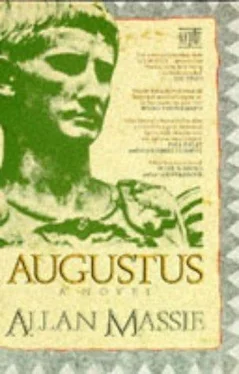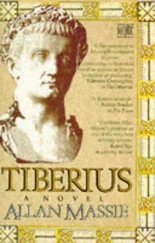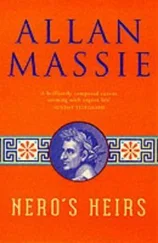Allan Massie - Augustus
Здесь есть возможность читать онлайн «Allan Massie - Augustus» весь текст электронной книги совершенно бесплатно (целиком полную версию без сокращений). В некоторых случаях можно слушать аудио, скачать через торрент в формате fb2 и присутствует краткое содержание. Жанр: Исторические приключения, на английском языке. Описание произведения, (предисловие) а так же отзывы посетителей доступны на портале библиотеки ЛибКат.
- Название:Augustus
- Автор:
- Жанр:
- Год:неизвестен
- ISBN:нет данных
- Рейтинг книги:4 / 5. Голосов: 1
-
Избранное:Добавить в избранное
- Отзывы:
-
Ваша оценка:
- 80
- 1
- 2
- 3
- 4
- 5
Augustus: краткое содержание, описание и аннотация
Предлагаем к чтению аннотацию, описание, краткое содержание или предисловие (зависит от того, что написал сам автор книги «Augustus»). Если вы не нашли необходимую информацию о книге — напишите в комментариях, мы постараемся отыскать её.
Augustus — читать онлайн бесплатно полную книгу (весь текст) целиком
Ниже представлен текст книги, разбитый по страницам. Система сохранения места последней прочитанной страницы, позволяет с удобством читать онлайн бесплатно книгу «Augustus», без необходимости каждый раз заново искать на чём Вы остановились. Поставьте закладку, и сможете в любой момент перейти на страницу, на которой закончили чтение.
Интервал:
Закладка:
I made it my business to investigate what happened at Nemi. The worship of Diana there was instituted by that Orestes, who slew Thoas, King of the Tauric Chersonese and then fled with his sister to Italy, carrying with him the image of the Tauric Diana hidden in a bundle of sticks. Now that Tauric Goddess is known to have been a savage and demanding deity; every stranger who landed on these harsh northern shores was sacrificed on her altars. In stealing her image, Orestes no doubt committed a great crime, and perhaps the ritual is intended to expiate this. After his death, his bones were brought from Aricia to Rome and buried in the gateway of the Temple of Saturn on the Capitol. It is said that the flight of the slave represents the flight of Orestes and that the rule of succession by the sword recalls the human sacrifices offered on the Tauric shore.
But for my part I find this unsatisfactory and believe the truth runs deeper. This explanation takes no account of the presence of the Golden Bough at Nemi; nor does it disclose why the priest also guards the descent to Avernus. I am no scholar, but it seems to me that the cruel ritual enacted at Nemi speaks of the responsibility of man's actions and the implacable justice of the Gods, from which there is neither escape nor mitigation. We are what our actions have made us. I am aware that this flies in the face of what most people believe about our character: that is, that it is immutable; that we are born the persons we become; and that life merely reveals what was already there but hidden. I hesitate, being neither philosopher, scholar nor sage, but only a soldier and administrator, from contradicting wiser men than I, but yet I cannot bring myself to believe this. I am what I feel, and I know in my bones that I have been formed by experience and my own deeds. True, I have been driven on by my native genius; but I have made myself by what I have done, and stand responsible for it.
Considering the matter now, it seems that it was Tiberius who in a strange way led me to Nemi. My anger with him had not abated, but my puzzlement had grown. I could not believe the reason he had given for his retirement to Rhodes, and I could not continue to believe he had done it to spite me. Nor did I believe that he acted – as some suggested – out of Republican leanings. Oh, I have never had any doubt that in many ways Tiberius disliked the form of my restored Republic. As an old-fashioned aristocrat he longed for Rome to be able to return to the days of the Scipios, as did Agrippa, different though his background was. Both, especially Tiberius, suffered from a nostalgia for a lost world. But both were also practical men. Tiberius was, and is, distinguished by a hard sense of political reality. He knew very well there was no other way but mine to manage the Roman Empire. He knew that, given more liberty, it would return to the frightful internecine strife of my youth. He despised his own generation too completely to believe otherwise for he saw how little of civic pride or antique virtue was there.
No, his withdrawal to Rhodes must, I thought, have deeper roots. (I know now of course that my explanation was too metaphysical.) It seemed to represent a profound dissatisfaction with the way things were, a hunger for some assurance of significance. Consider how he occupied himself on Rhodes, with his astronomical studies.
When he gazed into the heavens, and I into the mouth of Avernus, were we not both seeking the same thing?
ELEVEN
For the last three weeks I have been sleepless and irresolute. My nerves jangle. Every now and then, two or three times a day in fact, a mist has swum across my eyes. I have a pain in my left side, and my appetite cannot be tempted even by anchovies, cheese or peaches. I have caught Livia observing me with a measuring scrutiny, and I cannot work. Even my correspondence has fallen behind.
I have told myself all this is the unavoidable working of old age, that I can feel Death's dusty breathing. I know this is no more than a half-truth, and all my life I have tried to go beyond half-truths; not for any moral reason, but because, whatever one says in public, a politician cannot rest content with the knowledge of half-truths. Ability to see things as they are is the pre-condition of judgement.
And I cannot escape the conclusion that it is this autobiography that has made me ill.
Oh, I have troubles enough. As ever the family worries me. The next generation, how remote from me. Drusus' son Germanicus is a fine boy, with the coltish confidence of youth, but he irritates Tiberius who sees him only as a poor version of his father. There is enough of Drusus in the boy to remind Tiberius of the brother with whom alone of men he was easy; and yet the differences – Germanicus' callow optimism which renders him inferior to his father – are such that Tiberius views him with suspicious resentment, not unmixed with contempt. I see rough water ahead in that relationship.
Then Drusus' other boy, Claudius, is a sad problem. He stammers and slobbers. (It is disgusting to be near him at mealtimes.) His own mother, Antonia, though the best and noblest of women, describes him as 'a monster'. 'Nature began to make a man, but gave up on the job,' she once said to me. Livia can hardly bear to look at him. She has often said that she can't understand how Drusus and Antonia, both splendid creatures, could have produced such a… and then she snaps her finger and seems lost for a word that will adequately describe the unfortunate boy.
Naturally his presence has been embarrassing and we have had all sorts of family discussions about it. Can he be permitted for instance to appear in public? 'The question is,' Tiberius once said to me, 'whether he has full command of his five senses.' 'Until we can decide on that,' I replied, 'he had better be kept in the background. The public mustn't be given the chance to laugh at him, and I'm afraid they would.' Yet the boy is not altogether a fool; he has brains of a sort; but he looks the sort of freak they display at fairs. I'm afraid he will have no sort of future at all, for he is clearly unsuited to public life.
And then there is my own grandson Agrippa Postumus, given to fits of uncontrollable violence…
Still, it is a May morning, and the sun is shining. The sea sparkles as if the world was young… I must bring myself to it. I have this absurd notion – no, I don't think it is really absurd – that I won't be well again till I have done so. And what is the point of autobiography if it doesn't tell the truth? (A question I remember Horace asking, with a smile so self-consciously impudent as to be in fact apologetic, when he told me he had been perusing Caesar's memoirs again, and found them disingenuous; I was so pleased that I sent him some Rhaetian wine, telling him it was much better than the Falernian he was in the habit of praising, though I didn't actually say why I was sending him the present. I wonder if he guessed.)
But I digress. I digress because I want to. There is always truth in digression – it reveals the speaker's mind. And mine is uneasy.
It was just such a morning as this. I remember that bird-like lightness of morning spirit when sunlight dances on the young leaves, and the day is not yet hot. Finches flitted, pink, gold and green with a flash of white among the fruit trees, and a blackbird was singing in an ilex at the bottom of the garden. I had not yet retired to the loggia but was dictating a letter to Lucius, who was then in Spain. As I spoke, I could see him clearly, and it was as if I heard his affectionate chatter.
And then Livia emerged from the house. It was going to be a hot day but she wore a dark gown. I remember thinking: how worn her face is.
She sat down beside me, and told the slaves to go away. She was holding a document, perhaps a letter, in her hand, which shook slightly, and, perhaps to disguise this, she raised it before her face and began to fan herself with it… I don't suppose the birds really stopped singing…
Читать дальшеИнтервал:
Закладка:
Похожие книги на «Augustus»
Представляем Вашему вниманию похожие книги на «Augustus» списком для выбора. Мы отобрали схожую по названию и смыслу литературу в надежде предоставить читателям больше вариантов отыскать новые, интересные, ещё непрочитанные произведения.
Обсуждение, отзывы о книге «Augustus» и просто собственные мнения читателей. Оставьте ваши комментарии, напишите, что Вы думаете о произведении, его смысле или главных героях. Укажите что конкретно понравилось, а что нет, и почему Вы так считаете.












